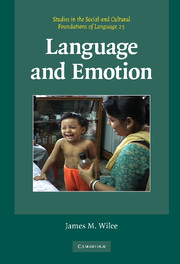Book contents
- Frontmatter
- Contents
- List of figures
- List of transcripts
- Acknowledgements
- Introduction
- Part I Theory
- 1 Defining the domain
- 2 The relationship of language and emotion
- 3 Approaches to language and emotion
- 4 The panhuman and the particular
- Part II Language, power, and honor
- Part III Identification and identity
- Part IV Histories of language and emotion
- Notes
- Glossary
- References
- Index
- STUDIES IN THE SOCIAL AND CULTURAL FOUNDATIONS OF LANGUAGE
1 - Defining the domain
Published online by Cambridge University Press: 05 June 2012
- Frontmatter
- Contents
- List of figures
- List of transcripts
- Acknowledgements
- Introduction
- Part I Theory
- 1 Defining the domain
- 2 The relationship of language and emotion
- 3 Approaches to language and emotion
- 4 The panhuman and the particular
- Part II Language, power, and honor
- Part III Identification and identity
- Part IV Histories of language and emotion
- Notes
- Glossary
- References
- Index
- STUDIES IN THE SOCIAL AND CULTURAL FOUNDATIONS OF LANGUAGE
Summary
When you describe the miserable and unfortunate, and want to make the reader feel pity, try to be somewhat colder – that seems to give a kind of background to another's grief, against which it stands out more clearly. Where as in your story the characters cry and you sigh. Yes, be more cold.…The more objective you are, the stronger will be the impression you make. – Chekhov
Emotion in language: we know it when we hear it, and when we read it. The expert author or playwright – like Chekhov – carefully controls the dosage of emotion she or he produces in her or his writing in order to maximize its effect. This, at any rate, represents a dominant sensibility in the West. Perhaps to many Western authors, emotion is like revenge – best served up cold.
Look back at the previous paragraph. I have used no emotion vocabulary at all, no words denoting particular emotions. Yet words like “we” in the previous paragraph have perhaps drawn readers into a cool form of intimacy at one level, while the general tone is academic and thus maintains its emotional distance. Note that even that is one possible relationship between language and emotion, one form of “affective stance” (Biber and Finegan 1989) – a cool, distanced stance. (Note, too, that university lectures share more in common with conversation than they do with academic writing, when it comes to markers of involved stance, Barbieri 2008.) And the first paragraph hints that this book points to cultural and historical differences in the ways speaking or “languaging” (Becker 1991) – a term signaling that we are talking about process, not thing – hooks feelings.
- Type
- Chapter
- Information
- Language and Emotion , pp. 19 - 38Publisher: Cambridge University PressPrint publication year: 2009

